Introduction
In recent years, there has been a growing interest in incorporating renewable energy solutions into various sectors, including healthcare. Autism care facilities, which serve a critical role in supporting individuals with autism, are increasingly turning to solar energy as a means to enhance their services. This article explores the multifaceted benefits of solar energy integration in autism care settings, highlighting financial savings, therapeutic advantages, and environmental impact, while providing insights into successful implementation strategies.
Financial Benefits of Solar Energy in Autism Care Facilities
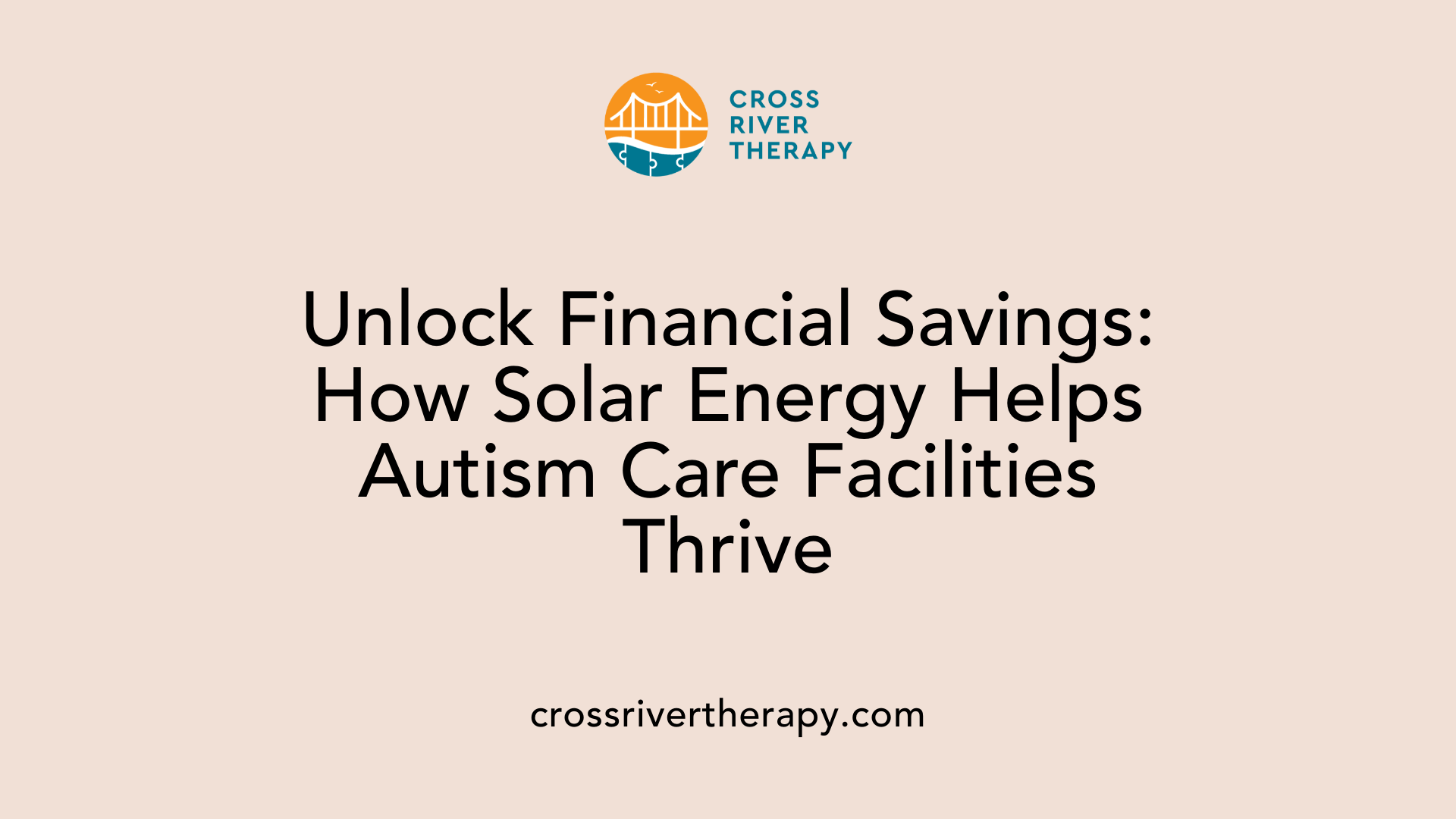
What are the benefits of solar energy in autism care facilities?
Solar energy offers numerous benefits to autism care facilities, particularly through significant financial savings. Facilities can expect to reduce their electricity bills by 20-40%, translating to potential savings of $20,000 to $40,000 over a 20-year period. This financial relief is vital, allowing autism centers to redirect these funds toward essential services, therapies, and educational programs that directly benefit individuals with autism.
How does this impact resource allocation?
By integrating solar energy, autism care centers enhance their ability to provide quality care. They can reallocate savings from energy bills to support specialized autism programs, including early intervention and therapeutic activities that are crucial for child development. These funds can also be used for staffing, equipment, and other operational needs, ensuring a higher standard of care.
What are the long-term financial implications?
The long-term financial implications of adopting solar energy are compelling. The initial investment typically has a payback period of 5 to 10 years, after which the facilities can enjoy ongoing savings. In addition to lowering operational costs, solar systems can improve property values by 5-15%, attracting more funding and support. Overall, solar energy not only alleviates financial burdens but also promotes environmental sustainability, creating healthier and more efficient environments for individuals with autism.
Implementing Solar Energy in Autism Care Centers
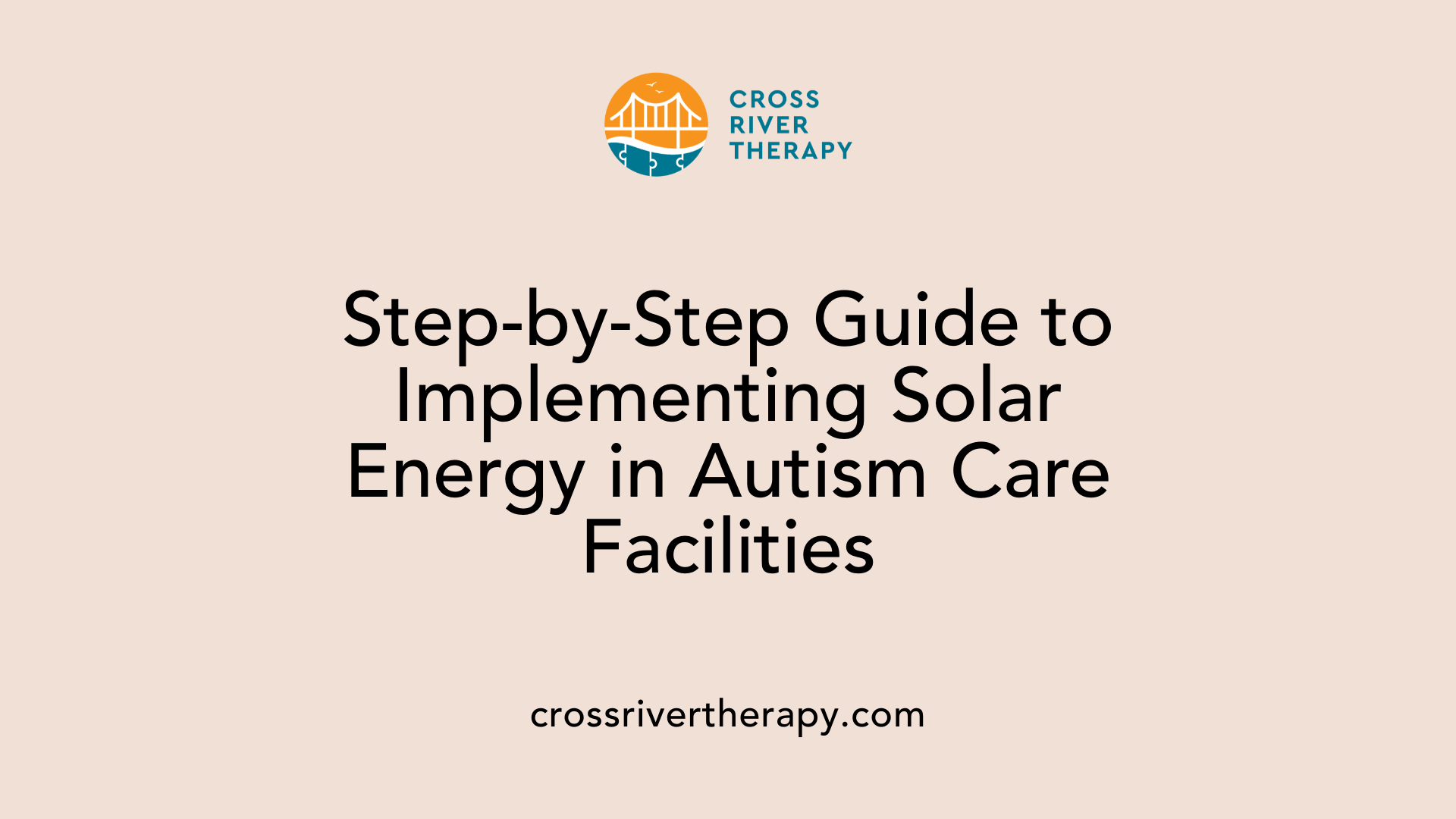
How can solar energy be implemented in autism care centers?
Implementing solar energy in autism care centers begins with conducting an energy audit, which will evaluate existing energy consumption and identify potential savings. Facilities should assess their site viability for solar installations by considering factors like roof space, direct sunlight, and any shading from nearby structures.
The integration of solar energy systems can lead to substantial financial benefits. Facilities can potentially see a reduction in electricity costs of up to 50%, enabling them to reallocate those funds towards essential programs and services that aid individuals with autism.
Furthermore, the adoption of solar technology is often supported by various government incentives and rebates, helping to mitigate the initial costs associated with installation and making it more feasible for care centers to transition to renewable energy. Regular maintenance and monitoring of solar panels will enhance their longevity and efficiency, ensuring that the facilities benefit from a reliable power supply necessary for uninterrupted care and services.
Successful examples such as the Pacific Autism Family Centre highlight how community engagement can bolster the implementation process. By rallying community support, these facilities not only enhance their operational stability but also contribute positively to the local environment by reducing carbon footprints.
Financial Implications and Savings from Solar Energy
What are the financial implications and potential savings of adopting solar energy solutions?
Adopting solar energy solutions can lead to substantial cost savings for autism care centers. Facilities typically report reductions in monthly utility bills by 30% to 50%, translating to potential savings of $20,000 to $40,000 over a 20-year span. This newfound financial flexibility allows these centers to allocate funds to critical programs and therapies that support individuals with autism.
What incentives and financial opportunities are available?
In addition to these savings, various federal and state incentives can further lower installation costs by about 30%. Facilities may also qualify for grants and programs designed to enhance the financial viability of renewable energy projects, making solar energy not only a sustainable option but also an economically sound choice. Furthermore, centers incorporating solar energy can also benefit from increased property values, estimated to rise by 5% to 15%, making them more attractive to investors.
How does solar energy impact property value?
The integration of solar power contributes positively to property value. With an investment in solar energy systems, autism care facilities see an increase in market appeal and sustainable practices, critical for attracting community support and funding. As both healthcare and environmental priorities come together, the adoption of solar energy proves beneficial for the financial health of autism centers, enhancing their overall impact within the community.
Enhancing Operational Efficiency Through Solar Energy
How does solar energy impact operational efficiency in autism care facilities?
Solar energy brings a remarkable transformation to the operational efficiency of autism care facilities. Primarily, it reduces reliance on traditional grid electricity, resulting in significant cost savings. Facilities can expect to see utility costs plummet by 20-40%, translating into long-term savings of $20,000 to $40,000 over a span of 20 years. This financial relief allows institutions to reinvest crucial resources back into essential programs and therapies for individuals with autism.
What are the benefits of increased energy independence?
Incorporating solar energy fosters energy independence for autism care facilities. By generating their electricity, these centers mitigate the volatility associated with traditional energy markets. Enhanced energy independence means that facilities can focus on providing consistent, high-quality care without the disruption of fluctuating energy costs.
How is service reliability improved with solar solutions?
Service reliability is further enhanced through solar energy's contribution to improved indoor air quality and natural light exposure. This not only benefits the overall health of individuals with autism but also creates a nurturing atmosphere for both residents and caregivers. In addition, solar energy systems provide a stable power supply, essential for maintaining uninterrupted service delivery.
| Operational Benefits |
Impact |
Financial Efficiency |
| Reduction in utility costs |
20-40% savings on electricity bills |
$20,000 to $40,000 savings over 20 years |
| Increased energy independence |
Reduced reliance on external providers |
Stability in energy pricing |
| Improved service reliability |
Enhanced indoor environments |
Better allocation of funds to therapies |
Overall, solar energy significantly boosts the operational efficiency of autism care facilities, promoting sustainability and enhanced care quality.
Environmental Impact of Solar Energy Integration
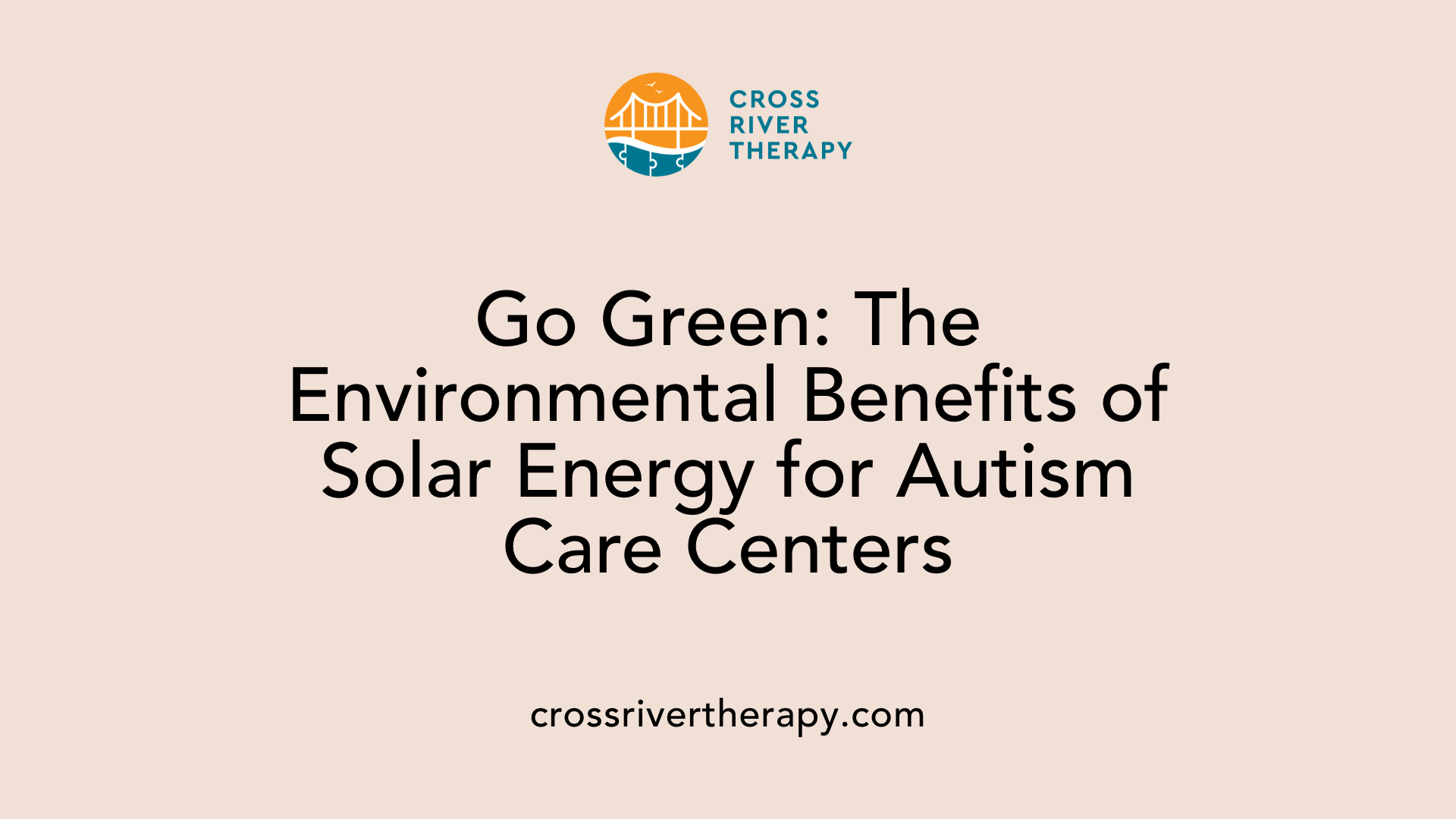
What are the environmental benefits of solar energy integration?
Solar energy integration offers numerous environmental benefits that enhance sustainability in autism care centers. By significantly reducing reliance on fossil fuels, solar energy can decrease greenhouse gas emissions by as much as 80%. This reduction is vital for combating climate change and fostering a cleaner atmosphere, especially for vulnerable populations such as individuals with autism, who may be sensitive to air quality issues.
Improvement in air quality
The use of solar energy directly contributes to improved air quality. Facilities adopting solar power can experience up to a 50% reduction in electricity-related emissions. This translates not only to cleaner air for residents and staff but also plays a crucial role in reducing respiratory problems and promoting overall health and well-being within these care environments.
Conservation of natural resources
Moreover, solar energy promotes the conservation of natural resources. Unlike conventional energy sources, solar panels require minimal water for their operation. This conserves a vital resource, especially in places facing water scarcity. The shift towards solar energy not only helps mitigate climate change but also supports sustainable development by preserving ecosystems and reducing habitat disruption, making it an environmentally friendly choice for autism care centers.
Summary of Environmental Benefits
| Benefit |
Impact |
Details |
| Reduction in Carbon Emissions |
Up to 80% |
Critical for climate action |
| Improved Air Quality |
30-50% reduction in emissions |
Healthier environments |
| Conservation of Natural Resources |
Minimal water use |
Preserves vital ecosystems |
Case Studies and Success Stories in Solar Energy Adoption
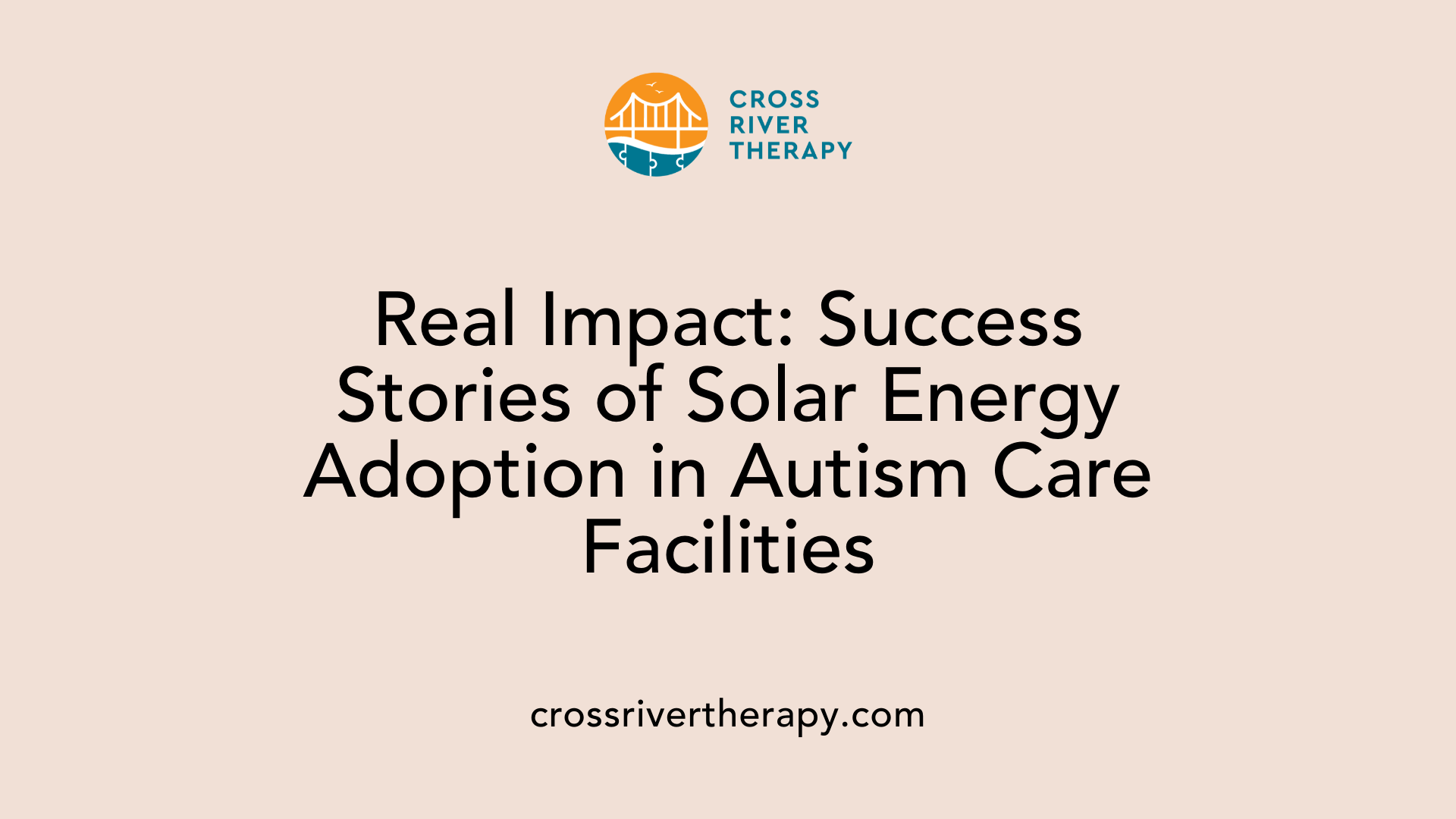
Several autism care facilities have successfully integrated solar energy systems, resulting in significant long-term savings on electricity costs that can be redirected towards essential services and therapies. For instance, the Pacific Autism Family Centre illustrates how community support and investment in solar technology can achieve substantial financial and operational benefits. This facility has experienced up to a 50% reduction in monthly energy expenses, enabling a focus on enhancing therapeutic programs for individuals with autism.
The Boston Medical Center (BMC) also launched the 'Clean Power Prescription' program, utilizing solar energy to provide energy bill credits to eligible patients, thus supporting both their economic and environmental health. With a new 356-kilowatt solar array installed, this initiative exemplifies innovation in care that addresses social determinants of health through clean energy.
Research shows that implementing solar panels can lead to a 30% to 50% reduction in energy consumption, improving patient experiences by fostering calmer and more therapeutic atmospheres. Not only does solar energy reduce operational costs and promote sustainability, but it also positively impacts property values by up to 15%, ensuring financial stability for autism care facilities.
Overall, the adoption of solar energy solutions not only benefits autism care providers but also alleviates financial burdens for families, creating supportive, resource-efficient spaces that bolster learning and development.
Solar Energy and its Therapeutic Advantages
Solar energy integration has proven beneficial for enhancing sensory tools and communication aids used in autism care centers. Innovations like solar-powered sensory devices can improve treatment efficacy by providing consistent power and functionality. This empowers caregivers and therapists to offer tailored interventions that cater to the unique sensory needs of individuals with autism.
Improvement in Therapeutic Settings
The shift to solar energy contributes significantly to creating therapeutic settings within autism care facilities. Natural light from solar installations promotes a more inviting atmosphere, improving mood and engagement for those receiving therapy. Moreover, the reduction of ambient noise from fossil fuel dependency creates a quieter environment, crucial for individuals sensitive to sound.
Positive Effects on Well-Being
Utilizing solar energy can lead to direct improvements in the overall well-being of individuals with autism. Cleaner air, resulting from reduced emissions, ensures healthier surroundings as air quality directly impacts respiratory health. By creating a sensory-friendly environment enriched with natural light and lower noise levels, facilities can enhance the comfort and satisfaction of residents, leading to better health outcomes.
Storage Solutions for Reliable Energy Supply
Importance of Energy Storage Systems
Integrating energy storage systems, such as batteries and smart energy management solutions, into autism care facilities is critical. These systems ensure a consistent and reliable power supply, which is essential for uninterrupted care and therapeutic services. By storing surplus solar energy generated during peak sunlight hours, facilities can use this stored energy during low sunlight periods, ensuring that operations remain steady.
Ensuring Uninterrupted Care Services
Reliable energy access directly impacts the quality of care provided to individuals with autism. Implementing solar energy storage systems allows care centers to maintain essential services, such as sensory tools and communication aids, without the disruption that can arise from power outages. This stability enhances therapeutic interventions, supporting individuals' well-being.
Stability During Outages
During power outages, energy storage systems serve as a reliable backup, safeguarding the operational functions of autism care centers. This capability not only enhances operational efficiency but also boosts overall community resilience, as the centers can continue to provide necessary support during critical situations. Overall, solar energy storage is integral in creating a sustainable, dependable environment for autism support services.
Community Engagement and Educational Initiatives
Community involvement is vital for the successful implementation of solar energy systems in autism care centers. Engaging local stakeholders helps build support and awareness about the benefits of solar power, ensuring projects align with community values and needs. For instance, facilities like the Pacific Autism Family Centre have demonstrated how community support and funding, including grants, can significantly offset installation costs and enhance operational efficiency.
Educational Programs on Sustainability
Educational initiatives promote understanding of sustainability practices among families of individuals with autism. These programs can include hands-on activities that encourage students to learn about solar energy and other renewable technologies. By fostering knowledge and engagement, centers can empower families to advocate for eco-friendly solutions, enhancing their involvement in the care process.
Building Awareness and Involvement
Community solar projects are instrumental in allowing families, especially those who rent and cannot install solar panels, to access renewable energy affordably. By enabling participation in these initiatives, communities strengthen ties and ensure that financial benefits from solar power—such as reduced utility bills—are felt across all demographics. This inclusive approach not only improves energy sustainability but also enhances the support network for individuals with autism.
Government Funding and Financial Incentives
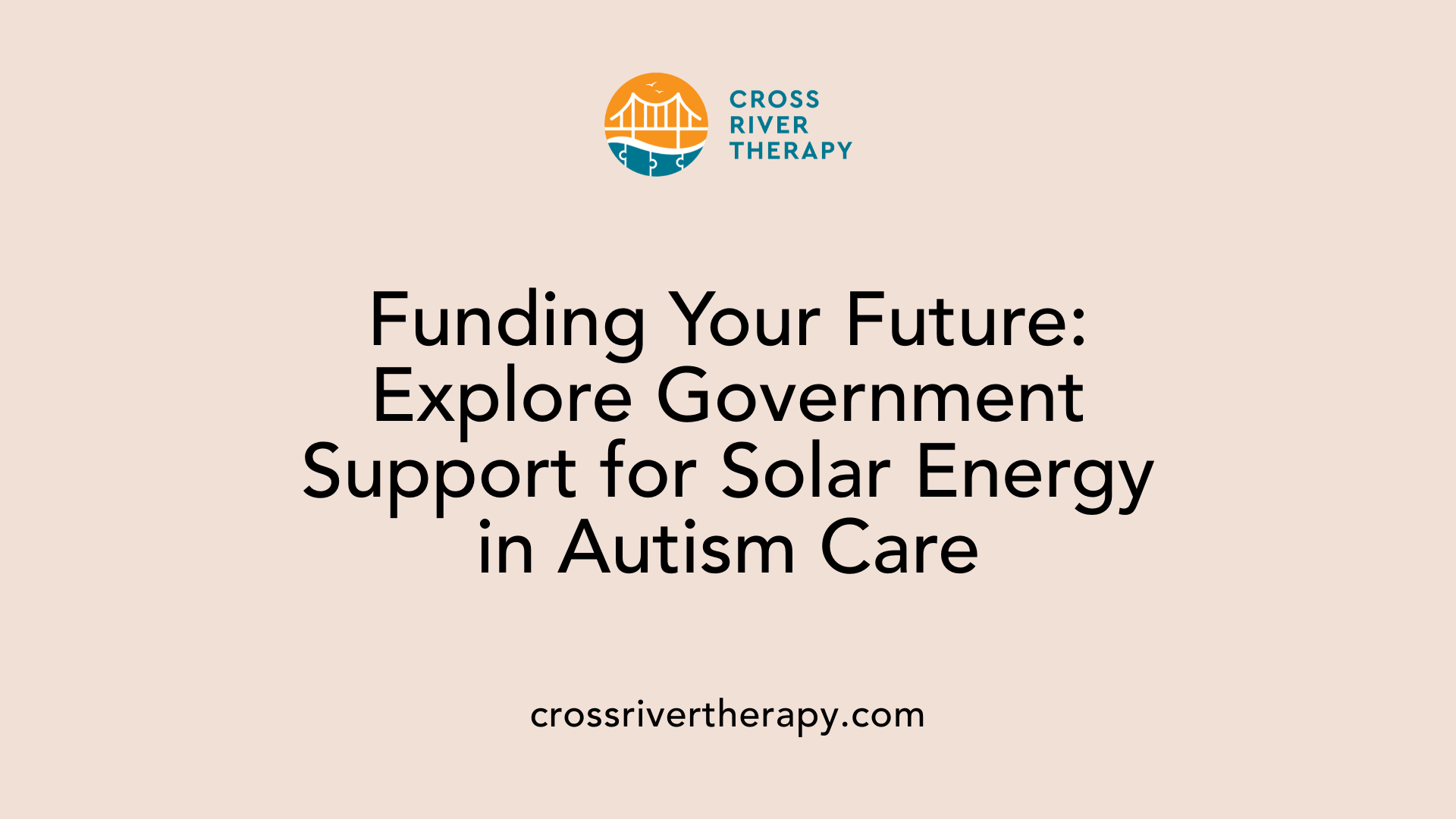
Available Grants and Subsidies
Various grants and subsidies exist to support the adoption of solar energy in autism care facilities. Programs like the U.S. Department of Energy are designed to provide financial assistance for renewable energy projects. Other initiatives, such as the Small Business Innovation Research (SBIR) program, offer funds aimed at innovative energy solutions, while the Rural Energy for America Program (REAP) focuses on supporting energy independence in rural settings.
Tax Incentives and Rebates
Tax incentives and rebates can also significantly lighten the upfront costs for solar infrastructure. Facilities may benefit from federal and state tax credits that can cover approximately 30% of the installation costs. These incentives make transitioning to solar energy more financially viable and attractive.
Programs Supporting Renewable Energy Adoption
Programs like LIHEAP (Low-Income Home Energy Assistance Program) offer additional financial support for families, facilitating access to energy-efficient solutions. Additionally, initiatives such as Boston Medical Center's Clean Power Prescription utilize solar arrays to provide discounted energy bills for low-income families, showcasing a successful model of integrating renewable energy into community health strategies.
| Funding Option |
Description |
Impact |
| U.S. Department of Energy Grants |
Financial assistance for renewable projects |
Supports solar installations |
| SBIR Program |
Funds for innovative energy solutions |
Encourages development |
| REAP Program |
Energy independence support for rural areas |
Benefits rural autism centers |
| Federal/State Tax Credits |
Rebate up to 30% for installation costs |
Lowers initial investment |
Impact on air quality and health
Integrating solar energy into autism care centers results in improved air quality. By reducing reliance on fossil fuels, these facilities contribute to a cleaner atmosphere. This shift can enhance respiratory health for individuals with autism, who may be particularly sensitive to environmental pollutants.
Benefits for sensitive individuals
Facilities that adopt solar power often create more sensory-friendly spaces. For individuals with autism, maintaining a calm and stable environment is essential. The use of renewable energy supports better indoor environments by regulating light and temperature, contributing to overall well-being.
Overall contributions to sustainability
Adopting solar energy also plays a crucial role in decreasing overall carbon footprints. Estimates suggest that facilities can achieve a 25-40% reduction in their carbon emissions, leading to a significant drop in greenhouse gases released into the atmosphere. By lowering monthly energy costs by up to 50%, funds can be redirected to support essential therapies and programs dedicated to enhancing the lives of individuals with autism.
| Topic |
Benefit |
Contribution to Sustainability |
| Air Quality |
Improved respiratory health due to cleaner environments |
Reducing reliance on fossil fuels |
| Sensory-Friendly Environments |
Enhanced comfort through better-regulated settings |
Supporting overall environmental health |
| Carbon Footprint Reduction |
Decreased greenhouse gas emissions |
Fostering long-term ecological balance |
Solar Technology Applications in Autism Support Facilities
Types of Solar Systems Used
Autism support facilities often deploy various solar systems, primarily solar photovoltaic (PV) panels. These systems convert sunlight into electricity, effectively lowering energy costs by 20% to 50%. Additionally, facilities may utilize solar thermal systems for heating purposes, contributing to energy efficiency.
Technological Advancements
Modern solar technologies include advanced solar management systems. These intelligent grids optimize energy usage, ensuring that power supply aligns with facility demand. Energy storage solutions, such as batteries, provide reliable electricity even during outages, essential for uninterrupted care services in autism support centers.
Customizations for Specific Needs
To address the unique sensory needs of individuals with autism, facilities can customize solar applications. For example, smart home systems can regulate lighting and temperature, creating comfortable environments. Integration of adaptive technologies also allows for real-time monitoring, enhancing therapeutic engagements tailored to individual requirements.
| Technology Type |
Benefits |
Customization Options |
| Solar PV Systems |
Reduces electricity costs significantly |
Smart energy management |
| Solar Thermal Systems |
Provides heating solutions |
Regulates temperatures for comfort |
| Energy Storage Solutions |
Ensures reliable power supply |
Implements backup systems for outages |
Conclusion
The transition to solar energy for autism care facilities is a transformative move that brings a host of benefits, from financial savings to therapeutic advancements. By adopting renewable energy practices, these centers not only improve their operational efficiency and environmental sustainability but also enhance the quality of care provided to individuals with autism. As technology advances and support grows from communities and governments alike, the future seems bright for solar energy in fostering more supportive and sustainable environments for autism care, ultimately reinforcing the commitment to both individual and planetary well-being.
References